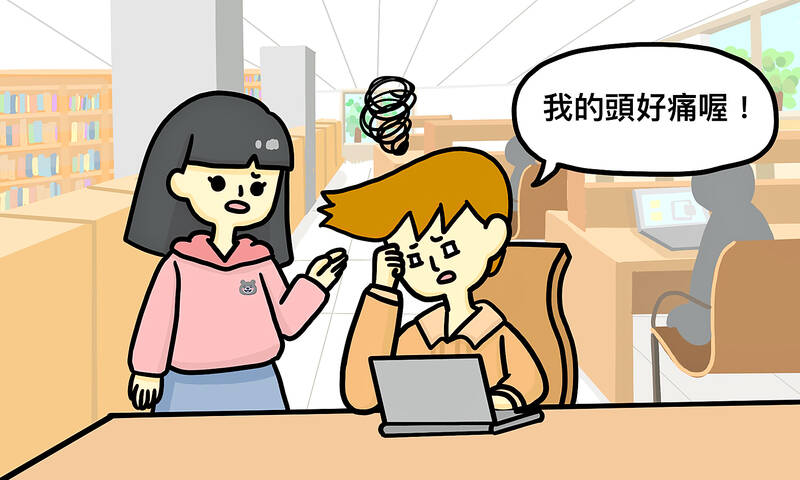對話 Dialogue
小實:馬克,你昨晚沒睡好嗎?
Xiǎoshí: Mǎkè, nǐ zuó wǎn méi shuì hǎo ma?

馬克:我已經失眠好幾天了,頭好痛喔!
Mǎkè: Wǒ yǐjīng shīmián hǎo jǐ tiān le, tóu hǎo tòng ō!
小實:失眠和頭痛都是常見的「文明病」啊。
Xiǎoshí: Shīmián hàn tóutòng dōu shì chángjiàn de “wénmíng bìng a.
馬克:文明病?是指現代人特有的疾病吧!
Mǎkè: Wénmíng bìng? Shì zhǐ xiàndài rén tèyǒu de jíbìng ba!
小實:是啊!現代人生活壓力太大了。
Xiǎoshí: Shì a! Xiàndài rén shēnghuó yālì tài dà le.
馬克:我聽說很多人還有「3C眼」,這也是常見的文明病吧?
Mǎkè: Wǒ tīng shuō hěnduō rén hái yǒu `3C yǎn’, zhè yěshì chángjiàn de wénmíng bìng ba?
小實:沒錯,用手機或電腦的時間太長了,就會造成視力退化!
Xiǎoshí: Méicuò, yòng shǒujī huò diànnǎo de shíjiān tài cháng le, jiù huì zàochéngshìlì tuìhuà!
馬克:看來現代科技不只帶來進步,也帶來了新的煩惱!
Mǎkè: Kàn lái xiàndài kējì bùzhǐ dài lái jìnbù, yě dài lái le xīn de fánnǎo.
翻譯 Translation
Xiaoshi: Mark, didn’t you sleep well last night?
Mark: I have been suffering from insomnia for several days and I have a terrible headache.
Xiaoshi: Insomnia and headaches are common ”diseases of civilization.”
Mark: “Diseases of civilization?” Are those illnesses unique to people in modern times?
Xiaomi: That’s right. Modern life is really stressful.
Mark: I heard that many people also have “3C eyes.” Is this also a typical disease of civilization?
Xiaomi: Yes, using mobile phones or computers for too long can cause vision degradation.
Mark: It seems that modern technology not only brings progress, it also brings new problems.
單字片語 Vocabulary
1. 失眠 (shīmián) insomnia
2. 頭痛 (tóutòng) headache
3. 文明病 (wénmíngbìng) disease of civilization
4. 疾病(jíbìng) disease
5. 現代 (xiàndài) modern
6. 壓力 (yālì) pressure
7. 視力 (shìlì) vision
8. 退化(tuìhuà) degenerate
9. 科技 (kējì) science and technology
10. 煩惱 (fánnǎo) trouble
教材音檔 Audio Files
教材影片 Video Files:
https://www.instagram.com/celc.nou_tw/guide/_/17999106352646292/
實踐大學華語中心提供
By Shih Chien University Chinese Language Center: https://chineseusc.com/

The Dutch introduced the Indian mango (Mangifera indica) to Taiwan in the 17th century. It is a green-skinned mango with thick fibers that get stuck in the teeth, but it boasts a rich aroma and a unique taste. In 1954, Taiwan’s Council of Agriculture introduced several mango cultivars from Florida, USA, including the Irwin, Haden, and Keitt varieties. After seven years of testing and domestication, the Irwin variety was chosen for promotion. Years later, the sample saplings started to bear fruit. These mangoes were large, with thin, vibrant red peels and golden pulp. The Irwin mangoes were mouth-wateringly sweet and

As the priest Antonius Hambroek stood in the dim chamber of Fort Zeelandia, his eldest daughter clung to him, her voice trembling. “Father, don’t go. They’ll kill you, and what will become of Mother and my sisters?” Outside, the sounds of Koxinga’s relentless canon siege boomed through the fortress. The defenders were on the brink of collapse. Starvation gnawed at their resolve, and the air carried the acrid stench of spent gunpowder and rotting flesh. Dutch reinforcements from Batavia had failed to arrive, leaving the garrison isolated and hopeless. Hambroek’s face was calm, though sorrow weighed heavily on his

對話 Dialogue 清清:今天中午我要多吃一點,不然晚上可能會吃不飽。 Qīngqing: Jīntiān zhōngwǔ wǒ yào duō chī yìdiǎn, bùrán wǎnshàng kěnéng huì chībùbǎo. 華華:怎麼了?為什麼會吃不飽? Huáhua: Zěnmele? Wèishénme huì chībùbǎo? 清清:今天大年初七,是「人日節」,傳統上結了婚的女兒要回家給父母送長壽麵,而且最好是素的,我姐姐會回來,只吃素麵,我應該很快就餓了。 Qīngqing: Jīntiān Dànián chūqī, shì “Rénrì jié,” chuántǒng shàng jiéle hūn de nǚ’ér yào huíjiā gěi fùmǔ sòng chángshòumiàn, érqiě zuìhǎo shì sù de, wǒ jiějie huì huílái, zhǐ chī sùmiàn, wǒ yīnggāi hěn kuài jiù èle. 華華:我還是第一次聽說有「人日節」呢!這是怎麼來的啊? Huáhua: Wǒ háishì dì yī cì tīngshuō yǒu “Rénrì jié” ne! Zhè shì zěnme lái de a? 清清:老一輩的人說,女媧是在第七天造出了「人」,所以今天可說是我們每個人的「生日」呢!生日快樂! Qīngqing: Lǎoyíbèi de rén shuō, Nǚwā shì zài dì qī tiān zào chūle “rén,” suǒyǐ jīntiān kěshuōshì wǒmen měi ge rén de “shēngrì” ne! Shēngrì kuàilè! 華華:你也是啊!欸?那前六天女媧都做了什麼呢? Huáhua: Nǐ yěshì a! Éi? Nà

As we bundle up in thick coats to stay warm during the winter, there is a population that has already adapted to extremely low temperatures. These people live in the remote city of Yakutsk, the coldest city on Earth. Yakutsk is situated in the heart of Siberia, which is the capital of the Sakha Republic in Russia. This historic mining city began to flourish in the 19th century following the discovery of gold deposits. Given its construction on permafrost, the average temperature in the city remains below 0°C for over half the year, with winter temperatures dropping to an astonishing -50°C.